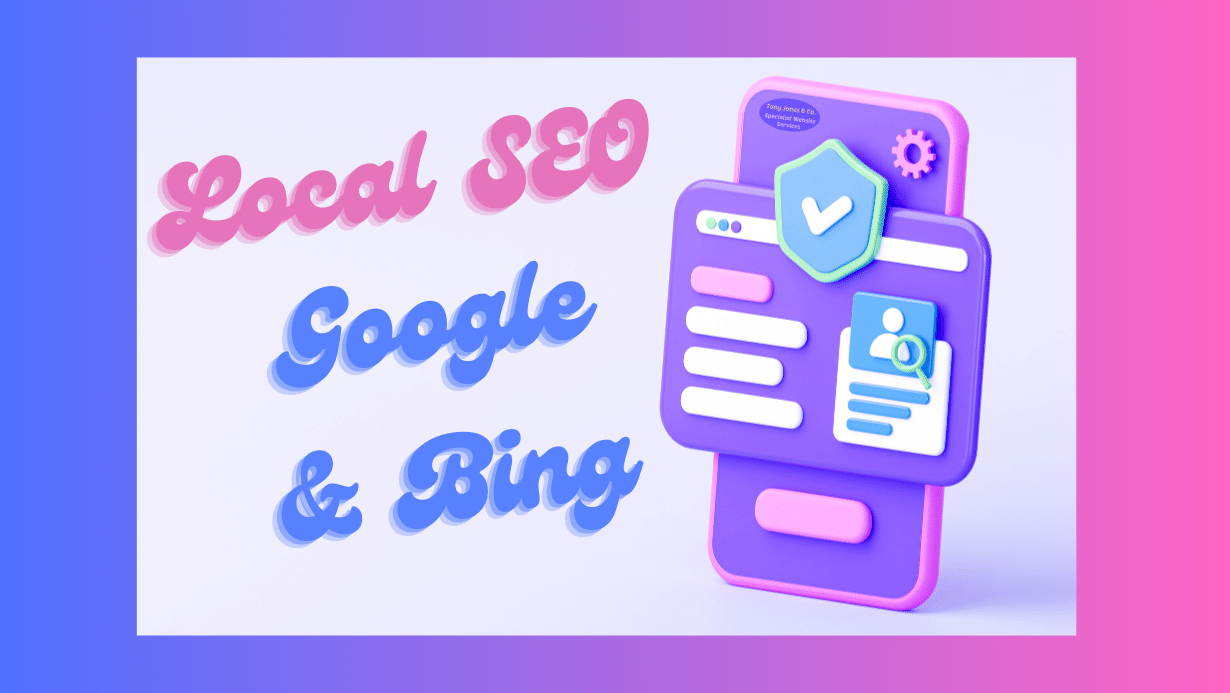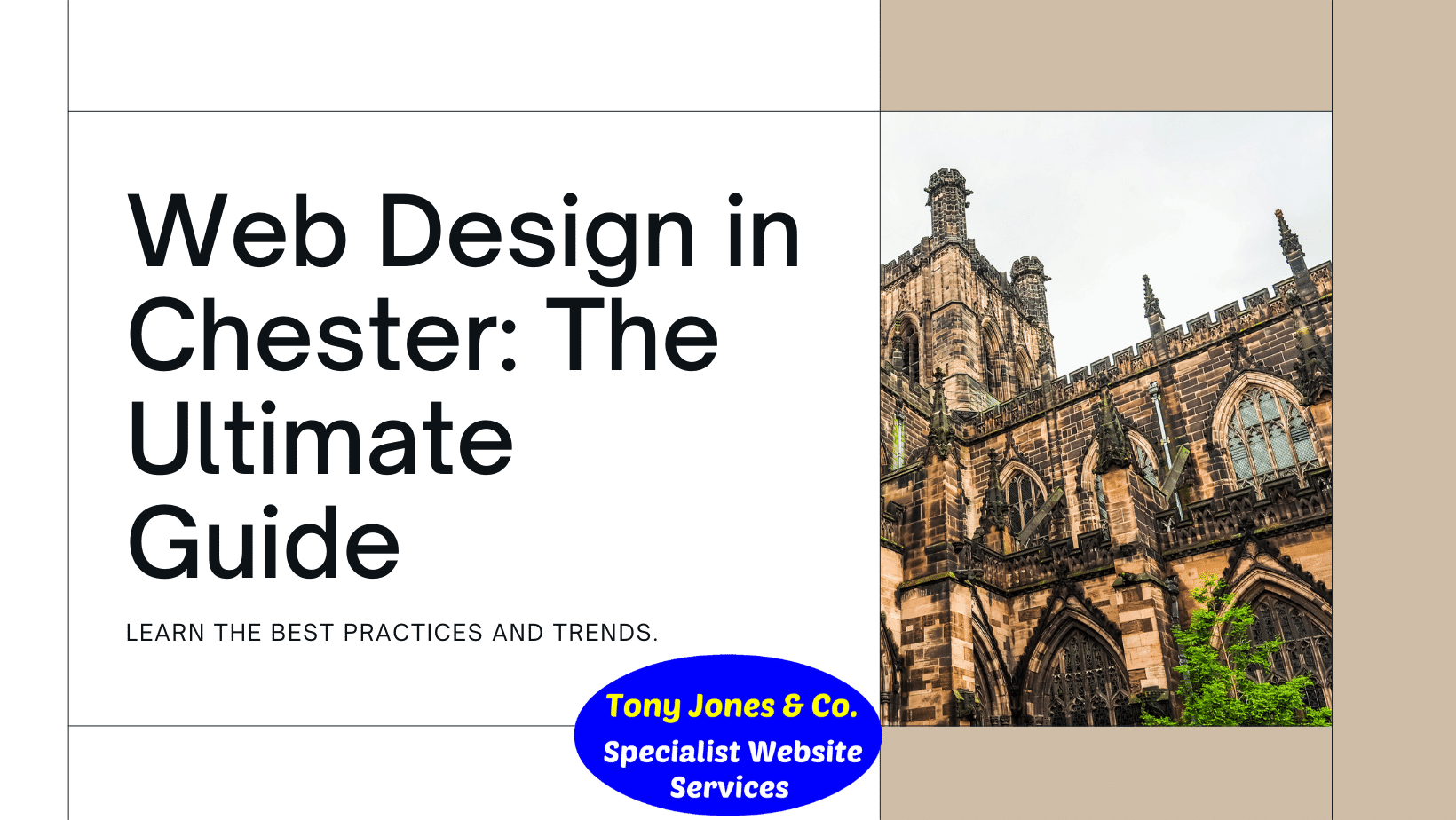Web Designer Wrexham, Professional Website Services - Tony Jones CITP, FBCS.
Unleash Your Potential: Achieve Page One Status on Google with Ease
Unlock page one on Google with ease! Master the SEO strategies and unleash your website's potential for success.

The Power of Page One
To truly unleash your online potential, achieving a page one ranking on Google is essential. The significance of ranking on the first page of Google cannot be overstated. It is a coveted position that can significantly impact your website's visibility, traffic, and success. Let's explore the significance and benefits of achieving page one status.
The Significance of Ranking on Page One of Google
When users conduct a search on Google, they are presented with a list of search results. However, studies have shown that the majority of users rarely venture beyond the first page of search results. In fact, the first page captures the lion's share of clicks, with the top few positions receiving the highest click-through rates. This means that if your website ranks on page two or beyond, it is less likely to attract organic traffic.
By securing a prominent position on page one of Google, your website gains increased visibility and exposure to potential customers. It serves as a virtual storefront, drawing users' attention and driving qualified traffic to your website. This increased visibility can be a game-changer for small businesses looking to expand their online presence. With the right SEO strategy, you can position your website to compete against industry leaders and establish your brand as a trusted authority.
Benefits of Achieving Page One Status
Achieving page one status on Google comes with a multitude of benefits. Let's explore some of the key advantages:
- Increased Organic Traffic: Ranking on page one of Google puts your website in front of a larger audience, resulting in increased organic traffic. This traffic is highly valuable as it consists of users actively searching for products, services, or information related to your industry.
- Enhanced Credibility and Trust: Users tend to perceive websites on page one as more trustworthy and credible. By appearing on this coveted page, your website gains credibility and instills confidence in potential customers.
- Higher Conversions and Sales: Quality traffic from page one rankings has a higher likelihood of converting into leads or sales. Users are more likely to engage with websites that appear at the top of the search results, leading to increased conversion rates and revenue.
- Competitive Advantage: Securing a page one ranking allows you to outshine your competitors and gain a competitive edge. It positions your brand as a top contender, making it more likely for users to choose your website over others.
- Long-term Results: Achieving page one status requires a well-executed SEO strategy. By investing in your website's SEO, you are setting yourself up for long-term success. Once you establish your position on page one, it becomes easier to maintain and defend against competitors.
To achieve page one status on Google, it is crucial to implement a comprehensive SEO strategy that incorporates elements such as keyword research and optimization, on-page and off-page SEO, high-quality content creation, and technical SEO best practices. By following these strategies and staying up to date with the ever-evolving SEO landscape, you can increase your chances of ranking on page one and reaping the benefits it brings. For more insights on improving your Google search ranking, check out our article on improving Google search ranking.
Understanding SEO
To achieve the coveted page one ranking on Google, it's essential to have a solid understanding of SEO. SEO stands for Search Engine Optimization and refers to the practice of optimizing your website and its content to improve its visibility and ranking on search engine results pages (SERPs).
What is SEO?
SEO encompasses a range of techniques and strategies aimed at making your website more attractive to search engines, ultimately leading to higher organic search rankings. By implementing SEO best practices, you increase the chances of your website appearing on the first page of search engine results, where the majority of user clicks are generated.
A successful SEO strategy involves various elements, including keyword research, on-page optimization, off-page strategies, and more. By combining these elements, you can enhance your website's visibility, drive targeted traffic, and ultimately grow your online presence.
Why is SEO Important for Small Businesses?
For small businesses, having a strong online presence is crucial for success in today's digital landscape. With millions of websites competing for attention, it's essential to stand out from the crowd. This is where SEO comes into play.
By investing in SEO, small businesses can level the playing field and compete with larger, more established brands. Here are a few reasons why SEO is important for small businesses:
- Increased Visibility: SEO helps your website rank higher in search engine results, making it more visible to potential customers searching for relevant products or services. This increased visibility can lead to more organic traffic and greater brand exposure.
- Targeted Traffic: SEO allows you to target specific keywords and phrases that are relevant to your business. By optimizing your website for these keywords, you can attract highly targeted traffic that is more likely to convert into customers.
- Cost-Effective Marketing: Compared to traditional advertising methods, SEO provides a cost-effective way to market your small business. While it requires an initial investment of time and resources, the long-term benefits can far outweigh the costs.
- Builds Trust and Credibility: Appearing on the first page of search results instills trust and confidence in potential customers. Users tend to view websites that rank higher as more trustworthy and credible, which can positively impact their purchasing decisions.
- Long-Term Results: Unlike paid advertising, which stops generating traffic once the budget runs out, SEO can provide long-term results. By consistently implementing SEO strategies, your website can maintain its visibility and rankings over time.
Understanding the fundamentals of SEO is essential for small businesses looking to improve their online presence and achieve page one status on Google. By focusing on improving Google search ranking through effective SEO techniques, you can drive more organic traffic, increase brand visibility, and ultimately grow your business. For more tips and strategies, check out our articles on seo tips for top google ranking and seo techniques for higher google ranking.
Key Elements of an Effective SEO Strategy
To achieve the coveted page one ranking on Google, there are several key elements that contribute to an effective SEO strategy. These elements include keyword research and optimization, on-page SEO optimization, and off-page SEO strategies.
Keyword Research and Optimization
Keyword research is the foundation of any successful SEO strategy. It involves identifying the search terms and phrases that are relevant to your business and have a high search volume. By understanding the keywords your target audience is using, you can optimize your website content to align with their search intent.
To conduct effective keyword research, you can use various tools such as Google Keyword Planner, SEMrush, or Moz Keyword Explorer. These tools provide valuable insights into search volume, competitiveness, and related keywords. By selecting the right keywords and incorporating them strategically into your website content, meta tags, headings, and URLs, you increase the chances of ranking higher on Google's search results page.
On-Page SEO Optimization
On-page SEO optimization refers to the practices that you implement directly on your website to improve its visibility and ranking on search engines. This includes optimizing the structure, content, and HTML source code of your webpages.
To optimize your website's on-page SEO, consider the following factors:
- Title tags and meta descriptions: Craft compelling and relevant title tags and meta descriptions for each page to entice users to click on your search result.
- Headings and subheadings: Use headings (H1, H2, etc.) to structure your content and make it more readable for both users and search engines.
- URL structure: Create SEO-friendly URLs that include relevant keywords and accurately describe the content of the page.
- Keyword optimization: Incorporate relevant keywords naturally within your content, including the page title, headings, body text, and image alt attributes.
- Image optimization: Optimize images by reducing file sizes, adding descriptive alt tags, and ensuring they are relevant to the content.
- Internal linking: Include internal links within your content to guide users to other relevant pages on your website.
- User experience (UX): Ensure your website is easy to navigate, mobile-friendly, and loads quickly to provide a positive user experience.
By implementing on-page SEO best practices, you improve the visibility and accessibility of your website, ultimately helping it rank higher in search engine results. For more tips on optimizing your website for better search rankings, check out our article on improving google search ranking.
Off-Page SEO Strategies
While on-page optimization focuses on optimizing your website itself, off-page SEO strategies involve activities carried out externally to improve your website's visibility and reputation. These strategies are aimed at building high-quality backlinks, increasing brand awareness, and establishing your website as a trusted source of information.
Some effective off-page SEO strategies include:
- Link building: Actively seek opportunities to acquire backlinks from reputable websites through guest blogging, influencer outreach, or creating compelling and shareable content.
- Social media marketing: Utilize various social media platforms to promote your content, engage with your audience, and encourage social sharing.
- Online directories and listings: Ensure your business is listed on relevant online directories and local listings to improve your online presence and visibility.
- Online reputation management: Monitor and manage your online reputation by responding to customer reviews and engaging with your audience across various online platforms.
- Content marketing: Create high-quality, informative, and shareable content that naturally attracts links and generates interest from your target audience.
Off-page SEO strategies complement your on-page efforts and help to establish your website's authority and credibility. By building a strong online presence and earning high-quality backlinks, you increase the likelihood of achieving a higher ranking on Google's search results page. For more guidance on off-page SEO techniques, take a look at our article on seo techniques for higher google ranking.
By implementing a comprehensive SEO strategy that encompasses keyword research and optimization, on-page SEO optimization, and off-page SEO strategies, you can improve your chances of achieving that coveted page one status on Google. Remember, SEO is an ongoing process, so continuously monitoring your website's performance and making data-driven adjustments is essential for long-term success.
Creating High-Quality Content
When it comes to improving your Google search ranking, creating high-quality content is an essential part of any effective SEO strategy. Search engines like Google prioritize websites that offer valuable, relevant, and well-written content. In this section, we will explore the importance of quality content for SEO and provide some tips for creating SEO-friendly content.
Importance of Quality Content for SEO
Quality content plays a crucial role in achieving a high Google search ranking. Here's why:
- Relevance and value: Search engines aim to provide users with the most relevant and valuable information. By creating high-quality content that is relevant to your target audience, you can increase your chances of ranking higher on Google's search results page.
- User engagement: Engaging content encourages users to spend more time on your website, reducing bounce rates and increasing user satisfaction. Search engines consider user engagement metrics, such as time on site and page views, when determining search rankings.
- Backlinks and social shares: Content that is informative, well-researched, and unique is more likely to be shared by users and linked to by other websites. These backlinks and social shares signal to search engines that your content is valuable, increasing its authority and boosting your search ranking.
- Long-term traffic: Quality content has the potential to generate consistent, long-term organic traffic. By providing valuable information that users are actively searching for, you can establish your website as a reliable source of information and attract a steady stream of visitors.
Tips for Creating SEO-friendly Content
To ensure your content is optimized for SEO, consider the following tips:
- Keyword research: Conduct thorough keyword research to identify relevant keywords and phrases that your target audience is searching for. Use these keywords strategically throughout your content, including in headings, subheadings, and within the body of the text.
- Unique and valuable content: Aim to create content that is unique, informative, and valuable to your audience. Provide answers to common questions, offer insights, and address pain points. This will not only attract users but also increase the likelihood of your content being shared and linked to.
- Optimize headings and subheadings: Use descriptive and keyword-rich headings and subheadings to structure your content. This helps search engines understand the context and relevance of your content, improving your chances of ranking higher in search results.
- Readable and engaging format: Break up your content into smaller paragraphs and use bullet points, numbered lists, and subheadings to improve readability. Additionally, incorporate images, videos, and infographics to make your content visually appealing and engaging.
- Meta tags and descriptions: Optimize your meta tags and descriptions to provide concise and accurate information about your content. These elements appear in search engine results, so it's important to make them compelling and relevant to attract clicks.
Remember, creating high-quality content is an ongoing process. Continuously update and expand your content to stay relevant and provide fresh information to your audience. By focusing on quality and relevance, you can enhance your SEO strategy and increase your chances of achieving a top Google search ranking. For more SEO tips, check out our article on SEO techniques for higher Google ranking.
Building a Strong Website Structure
To achieve a coveted position on page one of Google, it's crucial to have a strong website structure that optimizes both website navigation and user experience. These elements play a significant role in improving your website's visibility and ensuring a positive interaction with your audience.
Optimizing Website Navigation and User Experience
A well-structured website with intuitive navigation makes it easier for both users and search engines to explore and understand your content. When designing your website's navigation, consider the following:
- Clear and Logical Hierarchy: Organize your content in a logical manner, creating a clear hierarchy of pages and subpages. This helps users easily navigate through your website and find the information they're looking for. Additionally, search engines rely on this structure to understand the relevance and importance of each page.
- User-Friendly URLs: Use descriptive and keyword-rich URLs for each page of your website. This helps users and search engines better understand the content of the page without needing to click through. For example, instead of using "https://www.example.com/page1?id=12345", use "https://www.example.com/keyword-rich-page-title".
- Internal Linking: Incorporate internal links within your content to guide users to relevant pages on your website. This not only enhances the user experience but also helps search engines discover and index your content more effectively. Internal links also encourage users to spend more time on your website, reducing bounce rates and increasing engagement. Refer to our article on improving google search ranking for more tips on internal linking.
Importance of Mobile-Friendly Design
In today's mobile-driven world, having a mobile-friendly website is no longer an option but a necessity. With a significant portion of internet traffic coming from mobile devices, Google prioritizes mobile-friendly websites in its search results. To ensure your website is mobile-friendly:
- Responsive Design: Implement a responsive design that automatically adapts to different screen sizes and resolutions. This allows your website to provide an optimal viewing experience, regardless of the device being used.
- Fast Loading Speed: Mobile users expect quick loading times. Optimize your website's performance by compressing images, minimizing unnecessary scripts, and leveraging browser caching. A faster website not only improves user experience but also signals to search engines that your website is reliable and user-friendly.
- Thumb-Friendly Navigation: Make sure your website's navigation is easy to use on mobile devices. Utilize large, tappable buttons and easily accessible menus to enhance the mobile browsing experience.
By focusing on optimizing your website's navigation and ensuring mobile-friendliness, you create a strong foundation for achieving page one status on Google. Remember to continuously monitor and improve these aspects as part of your ongoing SEO strategy to maintain your position. For more information on SEO techniques, check out our article on seo techniques for higher google ranking.
Technical SEO Best Practices
To achieve page one status on Google, it's important to implement technical SEO best practices. These practices focus on optimizing various technical aspects of your website to improve its performance, visibility, and user experience. Here are three key areas to consider:
Website Speed and Performance Optimization
Website speed and performance play a crucial role in both user experience and search engine rankings. Slow-loading websites can lead to higher bounce rates and decreased user engagement. To optimize your website's speed and performance, consider the following:
- Minimize file sizes: Compress images and optimize code to reduce file sizes and improve loading times.
- Enable caching: Utilize browser caching to store static resources, such as images and CSS files, allowing returning visitors to load your site faster.
- Optimize server response time: Ensure your web hosting provider and server configurations are optimized for fast response times.
- Use a content delivery network (CDN): A CDN can help distribute your website's content across multiple servers worldwide, reducing latency and improving load times for users in different locations.
By improving your website's speed and performance, you can enhance user experience and increase the likelihood of achieving higher search engine rankings.
Utilizing Meta Tags and Descriptions
Meta tags and descriptions provide valuable information about your web pages to search engines and users. They play a crucial role in determining how your website appears in search engine results pages (SERPs). Consider the following best practices for utilizing meta tags and descriptions effectively:
- Title tags: Craft descriptive and concise title tags (usually under 60 characters) that accurately represent the content of each web page. Include relevant keywords to improve the page's visibility in search results.
- Meta descriptions: Write compelling meta descriptions (usually under 160 characters) that entice users to click on your website in the search results. Include relevant keywords and a clear call-to-action to encourage engagement.
- Header tags: Use header tags (H1, H2, H3, etc.) to structure your content and highlight important sections. This helps search engines understand the context and hierarchy of your content.
By optimizing your meta tags and descriptions, you can improve the visibility and click-through rates of your web pages in search results.
Implementing Schema Markup
Schema markup is a structured data vocabulary that can be added to your website's HTML code to provide additional context to search engines. It helps search engines better understand the content on your web pages, which can lead to enhanced search engine visibility and rich snippets in SERPs. Consider the following best practices for implementing schema markup:
- Identify relevant schema types: Determine the most appropriate schema types for your content, such as articles, products, events, or local businesses.
- Add schema markup to your web pages: Implement the necessary schema markup using JSON-LD or microdata formats. This includes marking up key information such as product details, reviews, opening hours, and more.
- Validate your schema markup: Use Google's Structured Data Testing Tool or other validation tools to ensure your schema markup is implemented correctly.
By implementing schema markup, you can provide search engines with additional information about your web pages, increasing the likelihood of appearing in rich snippets and improving your overall search engine visibility.
Implementing these technical SEO best practices, along with other elements of a comprehensive SEO strategy, can help improve your website's performance, visibility, and ultimately increase your chances of achieving page one status on Google. For more tips on improving your Google search ranking, check out our article on improving Google search ranking.
Tracking and Analyzing SEO Performance
To achieve and maintain a page one ranking on Google, it's essential to regularly track and analyze the performance of your SEO efforts. This allows you to identify what's working well and make data-driven adjustments to improve your ranking further. In this section, we will explore the tools for monitoring SEO performance, the key metrics to track, and the importance of making data-driven adjustments.
Tools for Monitoring SEO Performance
There are various tools available that can help you monitor and analyze your SEO performance. These tools provide valuable insights into your website's visibility, keyword rankings, organic traffic, and more. Some popular options include:
- Google Analytics: This free tool provides comprehensive data on your website's traffic, user behavior, and conversions. It allows you to track the organic traffic coming to your site and measure the effectiveness of your SEO efforts.
- Google Search Console: Another free tool from Google, Search Console provides insights into how your website appears in search results. It helps you monitor your site's indexing status, identify and fix technical issues, and view the search queries that drive traffic to your site.
- Third-party SEO tools: There are several paid tools available that offer advanced SEO analytics and reporting. These tools provide in-depth keyword research, competitor analysis, backlink monitoring, and more. Examples include Moz, SEMrush, and Ahrefs.
By utilizing these tools, you can gain valuable insights into your SEO performance and identify areas for improvement. Regular monitoring allows you to stay on top of any fluctuations in rankings or traffic and take appropriate actions to maintain your page one status.
Key Metrics to Track
When tracking your SEO performance, it's important to focus on key metrics that provide meaningful insights into your progress. Here are some essential metrics to track:
- Keyword rankings: Monitor your website's rankings for target keywords. Keep an eye on the position changes to identify which keywords are improving and which may require further optimization. Check out our article on improving google search ranking for more tips.
- Organic traffic: Measure the amount of traffic coming to your website from organic search. Analyze trends over time to identify any significant changes in traffic patterns. This metric helps you understand the impact of your SEO efforts on driving organic visitors to your site.
- Click-through rate (CTR): Evaluate the percentage of users who click on your website's link in search results. A high CTR indicates that your page title and meta description are compelling and relevant to users' search queries. Optimize these elements to improve your CTR.
- Bounce rate: Bounce rate measures the percentage of users who leave your website after viewing only one page. A high bounce rate may indicate that your content or user experience needs improvement. Consider optimizing your content or website navigation to reduce bounce rates.
- Conversion rate: If your website has conversion goals, such as purchases, form submissions, or newsletter sign-ups, track the conversion rate. This metric helps you understand the effectiveness of your SEO in driving desired actions from visitors.
Making Data-driven Adjustments
Analyzing the data from your SEO performance tracking allows you to make informed decisions and adjustments to your strategy. Here are a few key areas where data can guide your SEO efforts:
- Keyword optimization: Identify keywords that are performing well and those that need improvement. Adjust your keyword targeting and content optimization accordingly. Check out our article on seo tips for top google ranking for more guidance.
- Content improvements: Analyze the performance of your content and identify areas for improvement. Look for patterns in the types of content that resonate with your audience and optimize your future content accordingly.
- Technical optimizations: Use data to identify technical issues that may be affecting your website's performance. Fix any crawl errors, improve website speed, and make sure your website is mobile-friendly. Our article on seo techniques for higher google ranking offers more insights.
By regularly tracking and analyzing your SEO performance, you can fine-tune your strategy to achieve and maintain a page one ranking on Google. Remember to stay up to date with the latest SEO trends and best practices to ensure continued success in the highly competitive online landscape.
Share on:
Questions or further information; please call Tony 07990 797302
About the author Tony Jones CITP FBCS:
An experienced and qualified Web Designer based in Wrexham, a Chartered IT Professional and a Fellow of the British Computer Society.
Contact us
More news and articles: - Websites, Design, SEO, Artificial Intelligence, anything Digital Technology.











